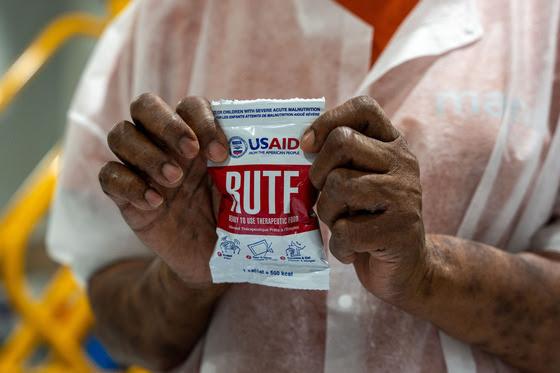United States Announces $200 Million for Nutrition Commodities to Treat Acute Malnutrition Around the World
Administrator Samantha Power announced today that the United States, through USAID, is committing $200 million to maximize the procurement and distribution of Ready-to-Use Therapeutic Food (RUTF) and other specialized nutritious foods to prevent and treat acute malnutrition. These specialized, life-saving nutritious foods will be distributed through our partners UNICEF and the UN World Food Program (WFP) to people in desperate need around the world including in Sudan, Burkina Faso, and Haiti. This builds on USAID’s ongoing, life-saving nutrition support in places like Gaza and Ethiopia, where this assistance is vitally needed to prevent developmental delays, disease, and even death.
Approximately 300 million people will need humanitarian assistance this year. Food insecurity has been compounded by conflicts around the world, including Russia’s war on Ukraine, and the impacts of the climate crisis, and famine looms in Gaza and Sudan as critical food and nutrition assistance is nearly impossible to access. Child wasting, the most acute, life-threatening form of malnutrition, affects 45 million children globally.
Administrator Power made the announcement today at MANA Nutrition Factory in Fitzgerald, Georgia, which produces RUTF. RUTF is one of the most effective treatments for wasting and is generally funded by USAID as part of a comprehensive package to support the patient, their family, and their community in an effort to save the child’s life and prevent them from slipping back into wasting after they have recovered. With this commitment, we will help get this lifesaving malnutrition prevention and treatment to millions of additional children.
Today’s announcements builds on the 2022 announcement by a coalition of public and private partners that resulted in the largest ever funding mobilization for the issue, with half a billion announced on the margins of the 2022 United Nations General Assembly. USAID will continue to prioritize child nutrition, including by working to integrate child health care and nutrition programs at the community and facility level to strive for a world where no child dies because of a lack of food.
This global crisis has especially had a visible and catastrophic impact on children, and increased the number of children who are experiencing wasting. The U.S. remains deeply committed to fighting child wasting globally.

